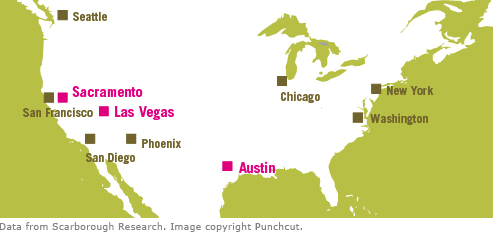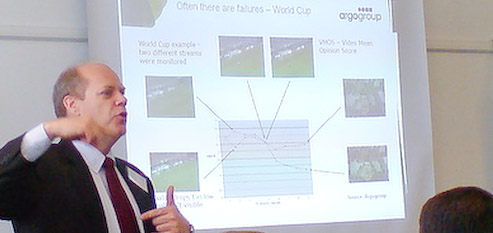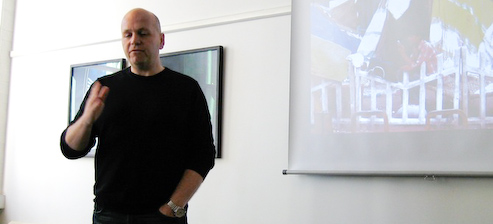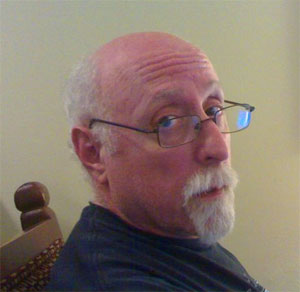We’ve moved our blog closer to home with a permanent address at Punchcut.com. This post can be found here: http://punchcut.com/perspectives/posts/ubicomp-moving-closer-mainstream.
In a previous post about the iPad, I introduced why I think the iPad and tablets have a place in the mainstream consumer’s everyday life. What I’ve found is that many of the attributes that make the iPad appealing and successful are also aspects that make incremental progress towards a computing concept called ubiquitous computing (ubicomp).
In this post I’ll give a brief intro to ubiquitous computing: it’s concepts, history, and current state. Most of this I’d like to be in service of us (those of us making devices) finding solutions for today out of these various historic and futurist perspectives. If we agree that the iPad fits ubicomp criteria, and we know the futurist path of ubicomp all the way to it’s ideal (networked t-shirts!), we may be able to derive a path for the consumer devices we’re working on today. We may also be able to detect future problems before they arrive. Let’s see where we can get…
Take a look at this short Intel commercial:
This commercial features a series of technological ah-ha moments. From video games to the internet, wireless internet and finally Intel’s 2010 Core processors (which features a very ubicomp ability of scaling power) each moment exhibits a technology that is not fully understood until personally experienced.
One could imagine another scene at the end:
Two 20-something, upper-middle-class men are hanging out watching an uneventful World Cup match at what appears to be a “man night”; Pizza boxes are strewn around a basement room with a Star Wars figurine collection on display in the background. One guy passes an iPad to another, sharing a YouTube video of a keyboard playing cat (or a very smart TED talk), in sheer delight, the recipient exclaims ”It’s like you’re HOLDING YouTube in your hands!”
This is one of the promises of ubiquitous computing.
Continue Reading »
Add this to digg, del.icio.us, etc.

If you were asked to list the top US “early adopter” cities you might start in Silicon Valley. Nope. Austin tops the list, then Las Vegas and Sacramento followed by San Diego, Washington DC, Seattle, Phoenix, Chicago, New York and San Francisco.
The Scarborough report is a free 70 page report that aims to hone in on the “digital savvy” of the US population. The report has narrowed these people down to a small 6% of Americans who have adopted certain digital behaviors — they have DVRs, MP3 players, HDTV; they are likely to use VOD, VOIP and more advanced mobile device features. The report busts assumptions that early adopters are all MySpace users (they’re more likely to read ESPN.com and CNN.com). Download the report for the full demographic analysis.
Add this to digg, del.icio.us, etc.
We like when the mainstream press highlights the right things. It’s a signal that the non-insiders might get a sense of the pains and frustrations felt in the mobile industry. Who else but Walt Mossberg could deliver it to the bad guys with WSJ credibility. Mossberg’s axis of evil includes Steve Jobs’ inked deal with “the devil,” (read the piece to see who that is), it includes 1970s-era AT&T, and the top US carriers whom he calls collectively the Soviet ministries.
My only suggestion for Mr. Mossberg is that he up the production value of his video studio. He speaks with the eloquence of someone who has a speech writer (presumably himself) but his close-up cam, with low quality video comes off a bit like a YouTube “video response.” But, hey, maybe that’s the best way to get heard these days.
Read or watch Mossberg’s Free My Phone rant at All Things D.
Add this to digg, del.icio.us, etc.

MEX CONFERENCE, LONDON — Paul Nerger, Vice President of Worldwide Sales & Marketing at Argogroup, spoke in response to the following manifesto point:
“User experience performance must be measured if it is to be improved. It must be constantly tracked through quantitative and qualitative methods. We think organizations throughout the value chain are failing to recognize the importance of understanding customers because quantifying the return on investment is too difficult”.
Paul started his talk by illustrating Argogroup’s services through case studies. One highlighted a “false event”, a momentary spike in service that results in temporary failures. Typical SMS-based false events include New Year Eve and the Super Bowl. So many people send New Year’s greetings to their family and friends at the stroke of midnight or to trash talk during the last few minutes of the Super Bowl that service spikes, resulting in high levels of data usage. When these patterns are not anticipated by carrier’s operations centers performance of the SMS service is drastically impacted, with message delivery unreasonably delayed. In some instances messages are not delivered at all.
Continue Reading »
Add this to digg, del.icio.us, etc.

MEX CONFERENCE, LONDON — Well the day has wound to a close here in London, and my mind is a-swirl with new ideas for the mobile experience. The format of this conference is rather refreshing, with a mixture of speakers, panel discussions, and group breakout sessions, which has been conducive for both keeping things interesting and providing opportunities for much-needed elbow-rubbing with other like minds shaping the mobile space.
The day kicked off this morning with Cliff Crosbie, Global Director of Retail Marketing for Nokia. Cliff has spent many years working in the retail space, and asked us the question, “When does exceptional service happen?” He pointed out that the big idea, the big brand, rests in the hands of the young person who is working in the mobile retail environment. It’s on them to deliver on the brand promise, which may be difficult if they are distracted, disenfranchised, or simply not knowledgable about the product.
Cliff quoted a recent article from The Sun, which said that “owning a mobile phone can improve living standards more than being given the right to vote.”
Continue Reading »
Add this to digg, del.icio.us, etc.
 Getting Walt Mossberg to positively review your tech gadget is possibly the most coveted media coverage a tech company could hope for. Mossberg is known for his no-nonsense approach and strong advocacy for users — which is why I like his Wall Street Journal column.
Getting Walt Mossberg to positively review your tech gadget is possibly the most coveted media coverage a tech company could hope for. Mossberg is known for his no-nonsense approach and strong advocacy for users — which is why I like his Wall Street Journal column.
Mossberg has teamed up with Co-Executive Editor Kara Swisher and put both their columns and blogs into one site, AllThingsD.com.
Mossberg said of himself: I aim my columns at mainstream users doing typical tasks who have little or no technical knowledge, no help from experts, and no appetite for becoming techies. These folks want the computer to do things for them. They don’t want to have to do much, if any, configuring of, or maintaining of, their computers. They have no patience for geeky procedures.
Nicely put.
Add this to digg, del.icio.us, etc.




 Getting Walt Mossberg to positively review your tech gadget is possibly the most coveted media coverage a tech company could hope for. Mossberg is known for his no-nonsense approach and strong advocacy for users — which is why I like his
Getting Walt Mossberg to positively review your tech gadget is possibly the most coveted media coverage a tech company could hope for. Mossberg is known for his no-nonsense approach and strong advocacy for users — which is why I like his